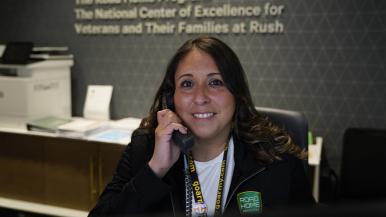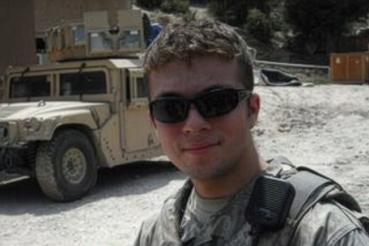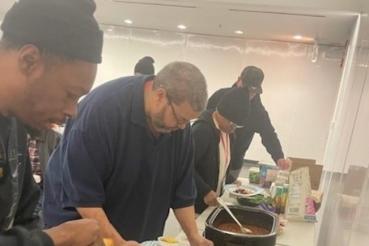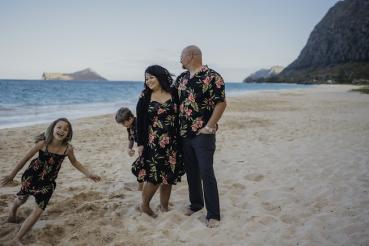From the age of 5, Dolores “Dee” Garcia knew she wanted to work in the medical world when she grew up. As a young girl, she’d spend hours pretending to X-ray and dress her grandfather’s scars from his days as a U.S. Army tank driver in World War II.
That playtime activity turned into real-life action when Dee, who now works as a clinic coordinator for the Road Home Program: The National Center of Excellence for Veterans and Their Families at RUSH, enlisted in the Army one week after graduating high school in 1999 with the goal of being a medic.
“My grandpa had passed away when I was younger, but he was always in the back of my mind and still is,” Dee said. “My parents weren’t very supportive of my decision to join the military. When I left, I was completely on my own. I didn’t have any real communication with my family after that. But I figured if my grandfather could do it, then I certainly could, too.”
Dee left home in the Chicago area to complete basic training at Fort Jackson in South Carolina, followed by medical training at Fort Sam Houston in Texas. She eventually was stationed at Fort Campbell in Kentucky, where she was in the headquarters company, 1-101st Aviation, 101st Airborne Division.
There, she led an aid station on base, assisted on the field and taught first aid. Dee was able to take more challenging classes, such as cardiac life support and advanced trauma. That training provided her with the ability to keep calm and read a person no matter the circumstance.
“The most rewarding part of my service was all the medical training I received,” she said. “My training, paired with the fact that I’m a veteran, makes it so easy to communicate with clients who walk through the Road Home Program’s doors. If someone doesn’t understand your lingo, especially when you’re seeking mental health care, it can make things even worse for you. I can speak their language.”
Transitioning out of active duty, into motherhood
Dee’s son, Adrian, was born during her last six months of active-duty service. She then switched to the Army Reserve, where she continued to serve until 2003.
“I didn’t think I’d be good playing the role of mom,” Dee reflected. “I went from carrying a rifle around to holding this soft, little baby. But I took to it so quickly. And then the moments when he wanted to play pretend Army, I knew exactly how to play Army.”
Around the time Adrian was in fourth grade, Dee started noticing something was amiss. He loved to socialize but was having difficulties in school. Adrian had been seeing Louis Kraus, MD,.chief of child and adolescent psychiatry at RUSH University Medical Center. Upon hearing Dee was a veteran, Kraus referred her to the Road Home Program. Dee had recommended services there to several fellow veterans, including a friend who was on the verge of homelessness. She didn’t realize resources were available for her son, too.
The Road Home Program’s innovative and evidence-based services go beyond helping veterans and active-duty service members. Care is also offered to military family members, who never see a bill for services.
Military families often face challenges before, during and after a loved one’s deployment, which is why Road Home Program experts are trained in mental and behavioral health care for children, adolescents and families. The Road Home Program has embraced veterans’ loved ones — however they define them — since the program first opened and has worked with each family to understand their unique situation and deliver appropriate interventions in a safe, supportive environment.
Dee was able to register Adrian as a client, and assessments resulted in a diagnosis of ADHD and a care plan. Dee’s employer-provided insurance at the time didn’t cover this care, but the Road Home Program provided it at no cost.
“Adrian was able to get his educational testing here and received an individualized education plan,” Dee said. “He was able to get the accommodations he needed to get through grade school and high school, where he was able to truly excel.”
Following in mom’s footsteps after receiving support
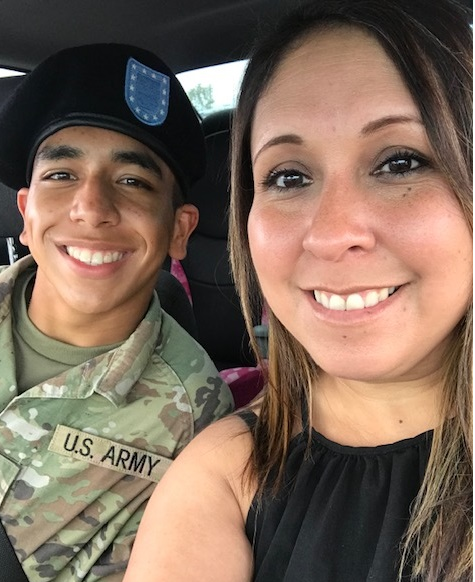
Inspired by his mom and the support he received at the Road Home Program, Adrian enlisted in the Army when he was 17. He continues to climb the ranks and is currently stationed at Joint Base Lewis-McChord in Washington.
“He’s 19 years old now and just got promoted to E-4, which is the rank of specialist for the Army,” Dee said. “I think the structure I gave him and the help he received at the Road Home Program is why he is doing so well in the military. He’s so young — being ranked E-4 already is profound.”
A desire to help veterans had always been in the back of Dee’s mind. It ultimately led her to work at the Road Home Program, where she has proudly shared her and Adrian’s story with clients who walk through the door since she started in August 2022.
Dee’s experiences allow her to form uniquely empathetic connections with clients.
“I feel for the families of service members,” she said. “These kids and spouses, even parents or other family members, can be greatly impacted by our services. We’re able to reach these veterans and their families and give them the support I didn’t have until we found the Road Home Program.”

